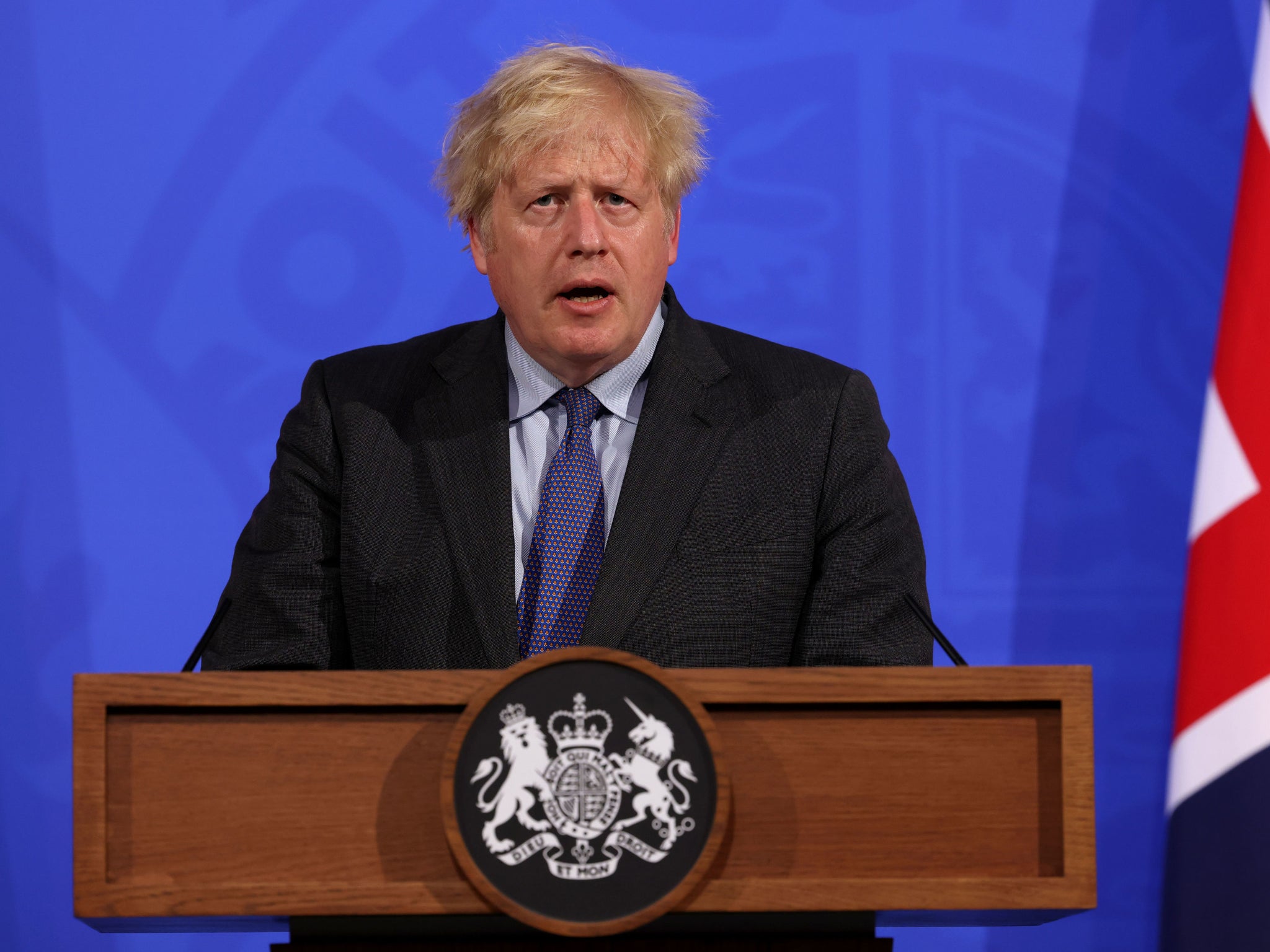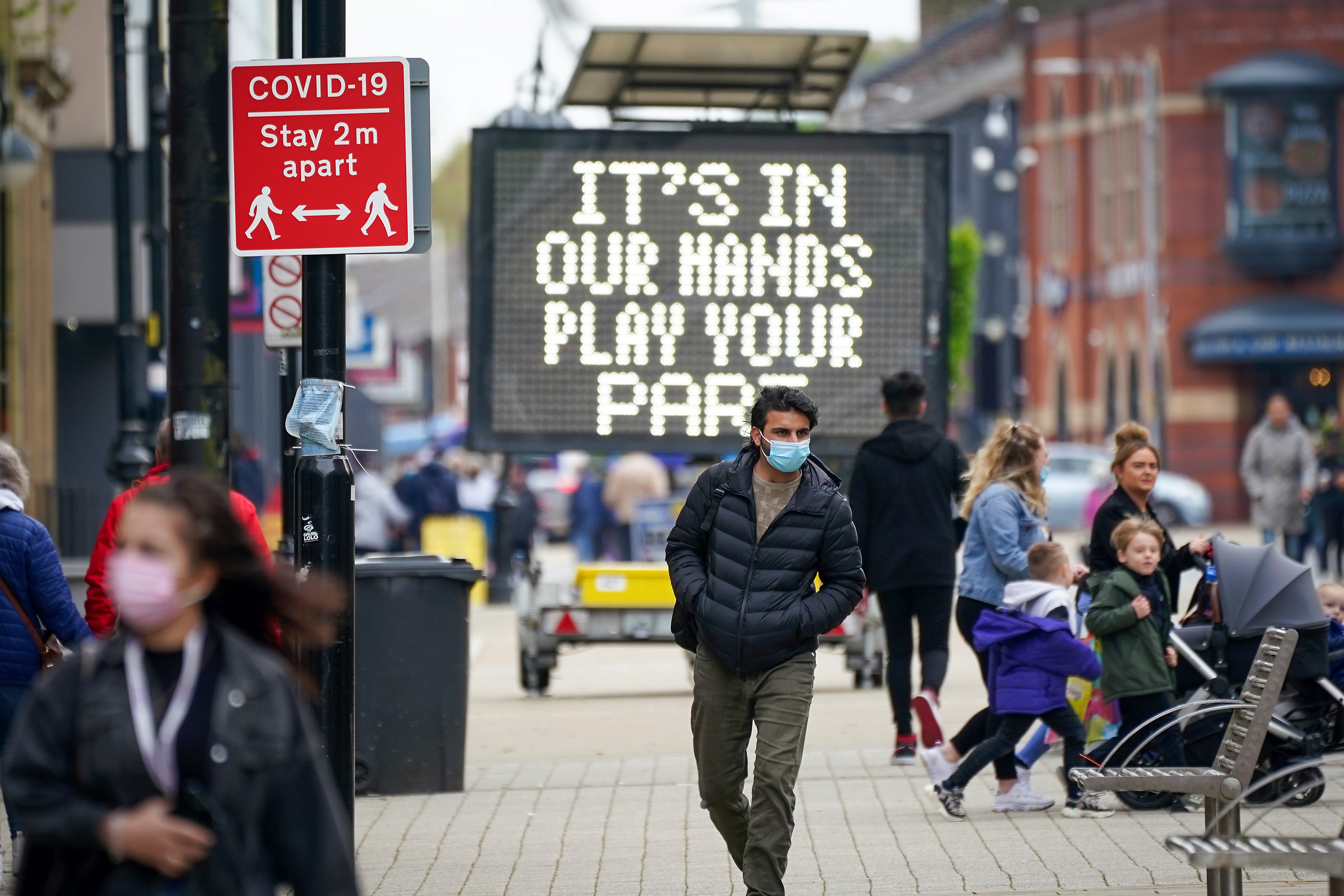When will lockdown end now that roadmap has been delayed? Everything we know
Boris Johnson confirms a four-week delay to ‘Freedom Day’ amid Delta variant surge
Your support helps us to tell the story
From reproductive rights to climate change to Big Tech, The Independent is on the ground when the story is developing. Whether it's investigating the financials of Elon Musk's pro-Trump PAC or producing our latest documentary, 'The A Word', which shines a light on the American women fighting for reproductive rights, we know how important it is to parse out the facts from the messaging.
At such a critical moment in US history, we need reporters on the ground. Your donation allows us to keep sending journalists to speak to both sides of the story.
The Independent is trusted by Americans across the entire political spectrum. And unlike many other quality news outlets, we choose not to lock Americans out of our reporting and analysis with paywalls. We believe quality journalism should be available to everyone, paid for by those who can afford it.
Your support makes all the difference.The UK government’s hopes of scrapping the final social restrictions imposed on the public to tackle the coronavirus pandemic have been put on hold as the Delta variant of the disease continues to drive up infections.
At Monday’s 6pm press conference, Boris Johnson confirmed that the lifting of remaining coronavirus restrictions in England will be delayed by four weeks to 19 July.
It was “sensible to wait just a little longer” and potentially until 19 July, he said, adding he was “confident” no further extensions of lockdown measures will be needed.
As it stood, Boris Johnson’s roadmap was originally scheduled to end on 21 June when the last precautionary measures were due to be lifted.
But the threat posed by the new strain – thought to be 60 per cent more transmissible than the Alpha variant – raised doubts about the wisdom of pressing ahead.
When asked whether he could rule out extending this delay to the easing of lockdown, the prime minister said: “At a certain stage we’re going to have to learn to live with the virus and to manage it as best we can.”
“At the end of that [four-week delay] ... we do think that we will have built up a very considerable wall of immunity around the whole of the population.”

The PM said he was confident based on the current evidence that unlocking could proceed on 19 July. (But then, he said the same sort of thing a couple of weeks ago about 21 June.)
He said the possibility that a new variant or some other change might force the government to keep the restrictions as they are.
It comes as new analysis shows England’s rate of new coronavirus cases has climbed to its highest level for more than three months. Some 37,729 new infections were recorded in England in the seven days to 9 June, according to Public Health England (PHE).
This is the equivalent of 67.0 cases per 100,000 people, the highest level since 2 March, when the rate stood at 69.6.
On Monday PHE reported that the UK had logged 7,742 new infections in just the last 24 hours – the highest one-day tally since February.
Mr Johnson was flanked by Sir Patrick Vallance and Chris Whitty at Monday’s press conference.
The PM told the nation: “This opening up ... has inevitably been accompanied by more infection and more hospitalisation. We cannot simply eliminate Covid, we must learn to live with it.”
He said he wanted the exit from lockdown to be “irreversible”. Mr Johnson said many younger people are still un-vaccinated and older people may still be susceptible. Those over 24 can book a first vaccine from tomorrow, and ministers hope to give two-thirds of all adults both doses by 19 July.
A delay of up to four weeks is a longer extension than the previously floated two-week period. According to The Times, a month-long postponement would give businesses more “certainty” in reopening, while allowing a higher number of people to finish their course of vaccination.
The government was understood to be concerned that a two-week delay may end up being extended, causing further setbacks for businesses, while The Guardian reported that chancellor Rishi Sunak was willing to accept a delay of up to a month in order to ensure it is a permanent move.
While there is significant pressure for a return to normality as the summer weather finally arrives and after more than 14 months of hardship, frustration and uncertainty, the prime minister has previously promised to be guided by “data, not dates” in his decision-making and, at present, the former is not looking good.
Analysis by Public Health England published on Friday shows that the number of Delta variant cases across the UK has trebled in a week. There are now 42,323 cases of the variant, which originated in India, up from 12,431 in the week to 3 June.
The variant is now the dominant strain in the UK, accounting for more than 90 per cent of new Covid-19 cases, while the rate of growth in infections across regions is currently showing a doubling time of between 4.5 days to 11.5 days.
The increase has been sufficient to cause NHS staff to come forward to warn that frontline workers in particular have been “broken” by the pandemic and are “close to burnout”.
“Everyone in the NHS at the moment is kind of terrified,” said Dr Megan Smith, legal and policy officer for campaign group EveryDoctor.
Dr Emily Bell, a GP from the northwest of England, added: “We know there's still a lot of unclear messaging going on, and I think unfortunately people’s behaviour has been relaxing.”
“And then the beaches are packed, nobody’s wearing a mask, there's no social distancing, and you just want to weep.
“The NHS is still in crisis and we cannot cope as it is. Unlocking poses a real threat to it just collapsing, and my biggest concern is patient safety.”
The public had also expressed anxiety over measures being lifted, with a recent poll for The Independent finding that 65 per cent of people said they were “worried” about dropping social distancing mandates.
A number of experts had also sounded the alarm about the risk involved in pushing on with stage four of the easing process.

Sir David King, former chief scientific adviser to the government and chair of the independent Sage group, told Sky on 7 June: “There are 5,300 new cases of the disease per day in the United Kingdom and we’re up about 2,000 on last week.
“Now we’ve been discussing whether or not we’re going into a serious third wave and I don’t think we can possibly wait any longer. This is the evidence of another wave appearing.”
“I think there’s a significant chance that [the date] could change,” Professor Adam Finn, a member of the Joint Committee on Vaccination and Immunisation, told the same network last week.
“We’re better off being cautious at this point and being able to progressively unlock ourselves than to overdo it and then end up having to lockdown fully all over again.”
His comments followed those of Professor Ravi Gupta, a member of the New and Emerging Respiratory Virus Threats Advisory Group counselling the government, who told BBC Radio 4’s Today programme on Bank Holiday Monday that the UK is now in the grip of an “early” third wave of Covid-19 infections spearheaded by the Delta variant.
“There has been exponential growth in the number of the new cases and at least three-quarters of them are the new variant,” the University of Cambridge academic said.
“Of course the numbers of cases are relatively low at the moment - all waves start with low numbers of cases that grumble in the background and then become explosive, so the key here is that what we are seeing here is the signs of an early wave.
“It will probably take longer than earlier waves to emerge because of the fact that we do have quite high levels of vaccination in the population, so there may be a false sense of security for some time, and that’s our concern.”
Prof Gupta pointed out that Mr Johnson’s roadmap was formulated before the existence of the variant was known and backed delaying the final easing by “a few weeks” to allow more people to be vaccinated against it.
“If you look at the costs and benefits of getting it wrong, I think it is heavily in favour of delay, so I think that's the key thing,” he said.
“People are not saying we should abandon the 21 June date altogether but just to delay it by a few weeks while we gather more intelligence and we can look at the trajectory in a clearer way.”
A number of other leading experts have agreed that the original date for relaxation was inadvisable given the current evidence but, so far, none are advocating new lockdowns - either national or local to hotspots like the hardest-hit north west, Midlands and London.
Instead, they were united in calling for stage four to be temporarily delayed and for the public to be patient one final time in order to avoid a fresh setback that could undo much of the good work this year’s successful vaccine rollout has achieved.
However, indecision over the extent of the delay required has caused fresh exasperation in some quarters, with Professor Robert Dingwall of Nottingham Trent University complaining on Times Radio on Tuesday morning that the government’s critics “can’t even agree on what delay they’d like.”
“By the time we get to 21 June, everybody who is in the nine priority groups or the highest risk will have had both jabs, and would have had a period of time to consolidate the immunity,” he said.
“What we are going on with is really running into younger age groups who are intrinsically much lower risk.
“Many of the scientists who’ve been talking over the weekend simply haven’t adjusted their expectations to understand that (for these people) Covid is a mild illness in the community.”
In better news, the immunisation programme itself is continuing to make major headway: nearly 57 per cent of adults in the UK are now estimated to have received both doses of a Covid-19 vaccine, with 79 per cent having been given a single jab.
Ultimately, the decision on whether to persist with unlocking rested with the prime minister, a man who was deeply reluctant to take unpopular decisions (and arguably left it too late) in relation to the first and second waves of the coronavirus, at least according to his estranged former adviser Dominic Cummings, who said as much during his recent marathon parliamentary testimony.




Join our commenting forum
Join thought-provoking conversations, follow other Independent readers and see their replies
Comments